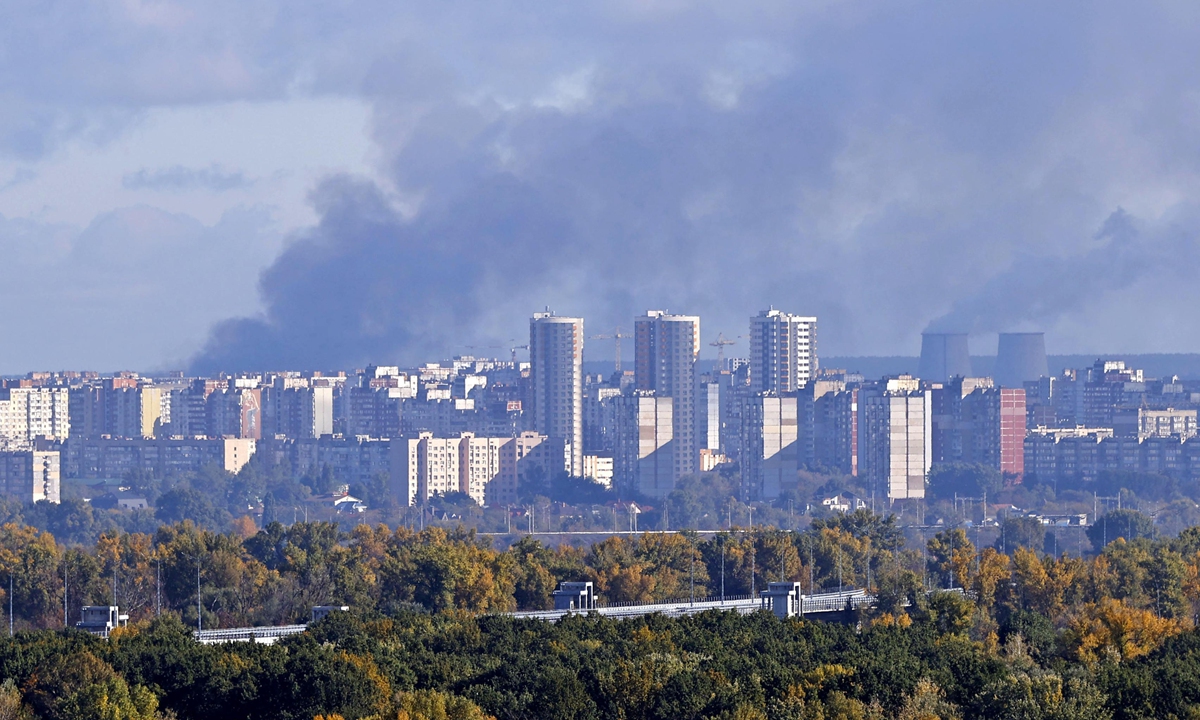
Black smoke rises over Ukraine's capital Kyiv on October 10, 2022, following Russian missile attacks earlier in the day. Photo: VCG
As tensions between Russia and Ukraine have escalated to a new level with multiple Ukrainian cities being hit by strikes on Monday and Tuesday following the Crimean Bridge explosion, the Chinese Embassy in Ukraine has issued three successive notices since Monday reiterating the grave safety situation in the country, reminding Chinese nationals to take emergency shelter and prepare emergency supplies.
Local Chinese reached by the Global Times said they heard air raid sirens sounding all night long, but are remaining relatively calm after the months of conflict.
Air raid sirens sounded across the sky of several Ukraine regions once again on Tuesday with local emergency services warning of the likelihood of more Russian strikes, a day after a series of Russian attacks left at least 19 people dead and over a hundred injured, according to media reports.
The multiple strikes by Russia came several days after a blast destroyed part of the Crimean Bridge, also called Kerch Bridge, an act that Russian President Vladimir Putin alleged was initiated and masterminded by Ukraine's special services and called "a terrorist act."
The Chinese Embassy in Ukraine, which has been following updates on the number of Chinese nationals in the country and their safety situations on a monthly basis, issued three notices on Monday, reminding fellow citizens not to return to Ukraine at the moment, while those who have already returned should take emergency measures and shelter.
Feeling the need to remind people to stay vigilant, the embassy said in another notice that "For some time now, our fellow citizens have become less wary of responding to air raid sirens. However, given the severe attacks at the moment, please make sure to enter shelter at the first sign of the sirens and carry emergency supplies in advance. Once again, please do not stay in the country unless it is urgent and necessary, and leave the country as soon as it is safe to do so."
The embassy has also initiated a new round of registration for Chinese nationals in the country, according to the latest notice on Monday.
Kale Lin, who has been in Ukraine for the past nine months, told the Global Times on Tuesday that he has heard air raid sirens seven and eight times a day, and the situation in Kiev was quite severe on Monday.
"When there's air raid siren, there are alerts on our phones, and we go to the air-raid shelters," said Lin, who is now in Poltava. When the siren sounded on Monday, the electricity and water supply was cut off and then there were sounds of explosions, so they went to the shelters.
Lin heard the sirens on Tuesday morning again, but he did not go to the shelter as electricity and water were resumed at home. Compared to the beginning of Russia-Ukraine military conflict when many Chinese people living there felt panic and nervous, Lin said that "now, many are getting used to the situation."
As Lin's wife is pregnant and it is not easy for them to go back to China, he decided to stay in Ukraine. "It's not like the beginning of the conflict when many people were panicked," the 30-year-old said.
After months of conflict, they know how to prepare and protect themselves in case of emergencies, the Global Times learned from some Chinese nationals in the country.
Gio Guo, another Chinese national based in Kiev with his family, told the Global Times on Tuesday that he did not even take shelter when the attacks occurred, as they have gotten used to the sirens in these months. One of the strikes was just 1.5 kilometers away from his house.
"Supplies are sufficient, just like before the conflict broke out, and prices remain basically stable," Guo said. He added that Ukrainians are friendly toward Chinese, and they have helped each other in times of need.
Replying to a question about the situation in Ukraine on Tuesday, Chinese Foreign Ministry spokesperson Mao Ning said the ongoing developments are worrisome. China calls on relevant parties to find proper ways to address differences through dialogue and consultation, and is ready to work with the international community and continue to play a constructive part in de-escalation efforts.




